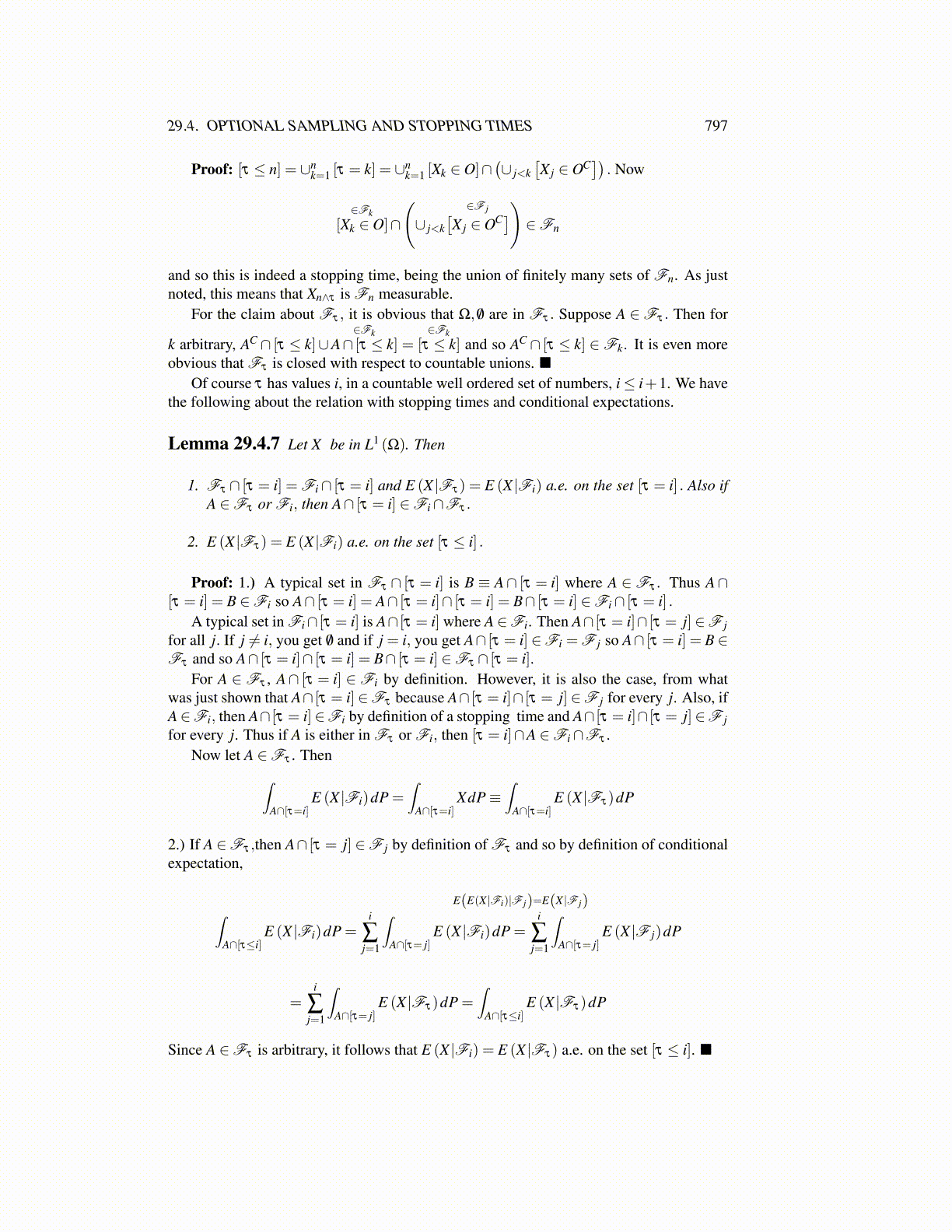
29.4. OPTIONAL SAMPLING AND STOPPING TIMES 797
Proof: [τ ≤ n] = ∪nk=1 [τ = k] = ∪n
k=1 [Xk ∈ O]∩(∪ j<k
[X j ∈ OC
]). Now
∈Fk[Xk ∈ O]∩
(∪ j<k
∈F j[X j ∈ OC]) ∈Fn
and so this is indeed a stopping time, being the union of finitely many sets of Fn. As justnoted, this means that Xn∧τ is Fn measurable.
For the claim about Fτ , it is obvious that Ω, /0 are in Fτ . Suppose A ∈Fτ . Then for
k arbitrary, AC ∩ [τ ≤ k]∪∈Fk
A∩ [τ ≤ k] =∈Fk
[τ ≤ k] and so AC ∩ [τ ≤ k] ∈Fk. It is even moreobvious that Fτ is closed with respect to countable unions. ■
Of course τ has values i, in a countable well ordered set of numbers, i≤ i+1. We havethe following about the relation with stopping times and conditional expectations.
Lemma 29.4.7 Let X be in L1 (Ω). Then
1. Fτ ∩ [τ = i] = Fi∩ [τ = i] and E (X |Fτ) = E (X |Fi) a.e. on the set [τ = i] . Also ifA ∈Fτ or Fi, then A∩ [τ = i] ∈Fi∩Fτ .
2. E (X |Fτ) = E (X |Fi) a.e. on the set [τ ≤ i] .
Proof: 1.) A typical set in Fτ ∩ [τ = i] is B ≡ A∩ [τ = i] where A ∈ Fτ . Thus A∩[τ = i] = B ∈Fi so A∩ [τ = i] = A∩ [τ = i]∩ [τ = i] = B∩ [τ = i] ∈Fi∩ [τ = i] .
A typical set in Fi∩ [τ = i] is A∩ [τ = i] where A∈Fi. Then A∩ [τ = i]∩ [τ = j]∈F jfor all j. If j ̸= i, you get /0 and if j = i, you get A∩ [τ = i] ∈Fi = F j so A∩ [τ = i] = B ∈Fτ and so A∩ [τ = i]∩ [τ = i] = B∩ [τ = i] ∈Fτ ∩ [τ = i].
For A ∈ Fτ , A∩ [τ = i] ∈ Fi by definition. However, it is also the case, from whatwas just shown that A∩ [τ = i]∈Fτ because A∩ [τ = i]∩ [τ = j]∈F j for every j. Also, ifA∈Fi, then A∩ [τ = i]∈Fi by definition of a stopping time and A∩ [τ = i]∩ [τ = j]∈F jfor every j. Thus if A is either in Fτ or Fi, then [τ = i]∩A ∈Fi∩Fτ .
Now let A ∈Fτ . Then∫A∩[τ=i]
E (X |Fi)dP =∫
A∩[τ=i]XdP≡
∫A∩[τ=i]
E (X |Fτ)dP
2.) If A ∈Fτ ,then A∩ [τ = j] ∈F j by definition of Fτ and so by definition of conditionalexpectation,
∫A∩[τ≤i]
E (X |Fi)dP =
E(E(X |Fi)|F j)=E(X |F j)i
∑j=1
∫A∩[τ= j]
E (X |Fi)dP =i
∑j=1
∫A∩[τ= j]
E (X |F j)dP
=i
∑j=1
∫A∩[τ= j]
E (X |Fτ)dP =∫
A∩[τ≤i]E (X |Fτ)dP
Since A ∈Fτ is arbitrary, it follows that E (X |Fi) = E (X |Fτ) a.e. on the set [τ ≤ i]. ■